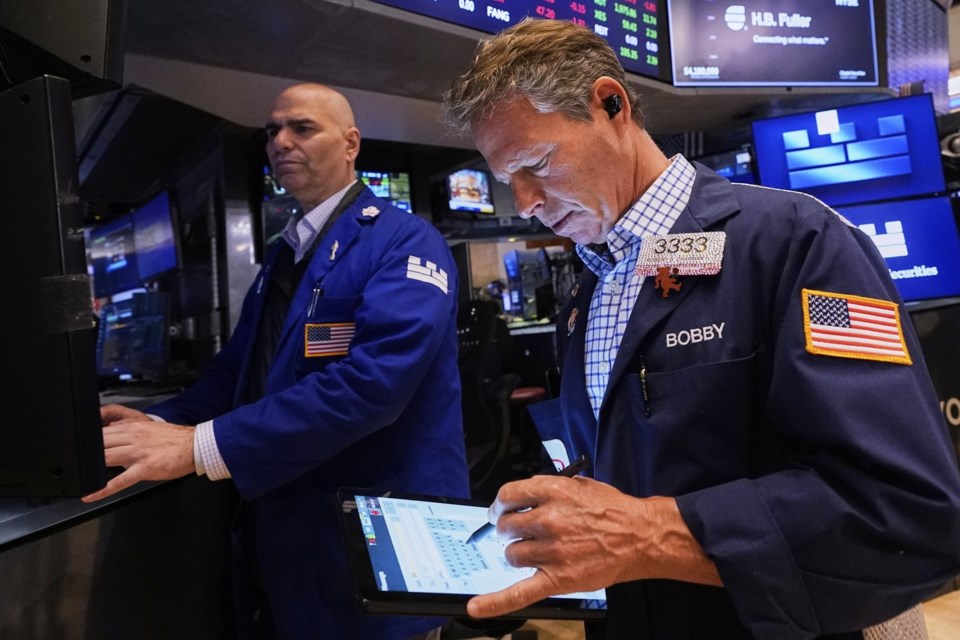Stocks are opening lower on Wall Street and crude prices are falling to a four-year low after the OPEC+ group of oil-producing nations said it plans to increase output. The S&P 500 slid 0.7% early Monday. The benchmark index is coming off its ninth straight gain. The Dow Jones Industrial Average fell 175 points, or 0.4%. The Nasdaq composite gave back 0.7%. U.S. benchmark crude fell to $57 a barrell. Berkshire Hathaway slumped 5% after legendary investor Warren Buffett announced over the weekend that he would step down as CEO by the end of the year after six decades at the helm.
THIS IS A BREAKING NEWS UPDATE. AP’s earlier story follows below.
Wall Street pointed toward losses in premarket trading Monday and oil prices fell to a four-year low after OPEC+ said it plans to boost output.
Futures for the S&P 500 slid 0.9% before the bell, while futures for the Dow Jones Industrial Average lost 0.7%. Nasdaq futures gave up 1.1%.
Berkshire Hathaway shares are down 3% after a surprise weekend announcement that CEO Warren Buffett by the end of the year.
The board of directors at the cash-rich conglomerate to keep the legendary 94-year-old investor as head of the board, a decision likely to relieve investors worried about Berkshire’s remarkable winning streak during Buffett's six decades at the helm.
U.S. benchmark crude oil fell as much as 4% overnight but recovered somewhat by early morning, declining 94 cents to $57.35 per barrel. Brent crude, the international standard, lost 83 cents to $60.46 per barrel.
During the weekend, the OPEC+ group of eight oil producing nations announced it will raise its output by 411,000 barrels per day as of June 1, stepping up production increases.
The group said strong fundamentals were behind the decision, though analysts also speculated that it might reflect a desire to curry favor with U.S. President Donald Trump before he makes a visit to the Middle East later this month.
Prices have fallen nearly 20% in the past three months as traders have factored in the likely impact of Trump's trade policies on the global economy. Trump has made delivering lower gas prices one of his talking points.
“Washington wants cheap energy, and Gulf producers still lean on U.S. security guarantees; the White House bears down, they listen,” Stephen Innes of SPI Asset Management said in a commentary.
“In that sense the U.S. president has become an unofficial swing vote inside OPEC+,” he said.
U.S. crude oil is down about 17% for the year, hitting lows not seen since the U.S. was emerging from the brief but sharp COVID-19 recession in early 2021. According to AAA, gasoline is selling for an average of about $3.17 per gallon, down from $3.66 per gallon a year ago.
But prices are falling to a point where many producers can no longer turn a profit.
Late Sunday, Trump announced on social media that he was imposing a coming into the U.S. that are produced overseas. It’s common for both large and small films to include production in the U.S. and in other countries, though it wasn't immediately clear how the tariffs would be implemented.
Shares of The Walt Disney Co. and Warner Bros. Discovery each fell more than 2% after hours. Netflix was 4.5% lower before the bell.
The U.S. economy is already showing signs of strain from Trump's tariff announcements, shrinking at a 0.3% annual pace during the first quarter of the year. It was slowed by a surge in imports as businesses tried to get ahead of Trump’s tariffs.
Companies have been cutting and withdrawing financial forecasts because of the uncertainty over how much tariffs will cost them and how much they will squeeze consumers and sap spending.
Markets were closed in Britain and much of Asia.
Germany’s DAX gained 0.7% while the CAC 40 in Paris slipped 0.6%.
Australia's S&P/ASX 200 lost 1% to 8,157.80 while Taiwan's Taiex declined 1.2%.
The U.S. dollar fell to 143.83 Japanese yen from 144.71 yen.
The euro climbed to $1.1344 from 1.1306.
On Friday, Wall Street extended its gains to a ninth straight day, the market’s longest winning streak since 2004. It has reclaimed much of the ground it lost after President Donald Trump escalated his trade war in early April.
Heading into Monday's open, the S&P 500 is still down 3.3% so far this year, and 7.4% below the record it reached in February.
Jiang Junzhe And Matt Ott, The Associated Press




